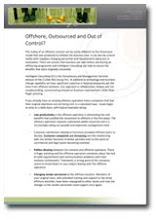Work-life balance is a topic consistently dividing opinions.
With developments such as UK flexible working laws, Germany’s proposed anti-stress legislation and findings regarding work related mental health issues, it has never been more important. 39% of 2013-14 work related illnesses were caused by work
stress, depression or anxiety and over 40% of employees neglected other aspects of their life.
Whilst an employee issue, employers need to increase their understanding and
realise that an effective leadership response could be hugely beneficial.
A number of factors have contributed to the issue’s
prominence, perhaps most critically: the increasingly global business
environment (time zone disparity), flexible working and the consistently
accelerating integration of technology into the workplace. As a result the ‘9-5
working day’ is growing outdated, whilst the line between work and home life is
becoming increasingly blurred; thus giving birth to the ‘always on’ culture
that plagues many employees. Both employees and employers are culpable, and whilst
neither can have total control of the relationship, improvements can be made.
What can employees do?
With 30% of UK employees experiencing a mental health problem
each year, action is clearly required. Long hours are stressful enough, but
those continuously planning and thinking about work when they get home, never
truly leave the office. Therefore, it is important to have hobbies, interests
and activities that they can escape to in their free time. In addition,
employees should take regular breaks at work and time away to re-energise; if
they have set limited annual leave, they should try to stagger it across the
year. One idea championed by many is to only respond to texts and phone calls
when out of office, ignoring emails. This way, people only contact you if
issues can’t be sorted out independently or if they’re desperate. Helen Taylor (Head
of HR, The Instant Group) advised: “when you do take time out, leave work
at work, you won’t
deliver anything meaningful and reading emails endlessly will prevent you from
having a good break”.
When working, time management can be a crucial tool and Helen
Taylor suggests that “...we often get caught up completing ‘easy’ tasks; using
our best hours for the most important
tasks is key”. By
working smarter, they may be able to avoid working longer. If employees feel taken
advantage of with unreasonable workloads/deadlines, they need to communicate
this with management.
What can employers do?
Only 13% of employees worldwide are engaged in their work, with
twice as many disengaged/hostile. Richard Straub (ex-IBM Executive) writes: “Instead
of liberating the creative and innovative
energy of employees, blind
processes and rigid hierarchies hold them down”. Businesses need to embrace
flexible working and trust employees, therefore empowering them to work how and
when they are most effective. This gives employees the freedom to handle
distracting personal tasks as and when required, enabling a sharper focus on
work.
The required transformation is to measure overall output, not
input. People work best in different ways; if an employee is exceeding their targets,
does it matter if they visit the supermarket at 3pm on a Wednesday? Outdoor
clothing company Patagonia enabled staff to set their own hours, use on-site
day-care and take regular breaks for exercise; their profits tripled in the last
5 years. Friedman concludes that: “Instead of ‘work-life balance’, organisations
are better off empowering employees to integrate work and life in ways that
position them to succeed at both”.








No comments:
Post a Comment